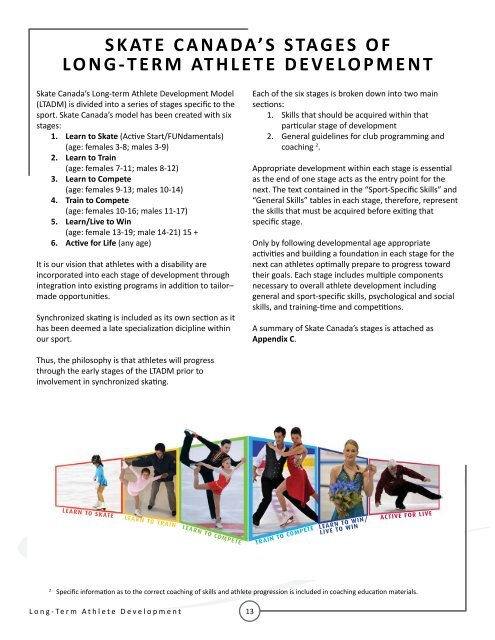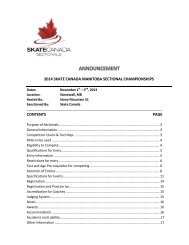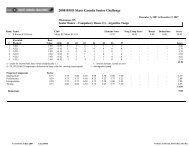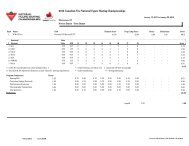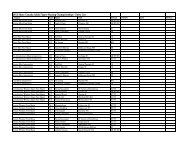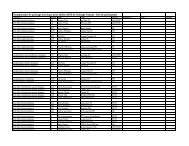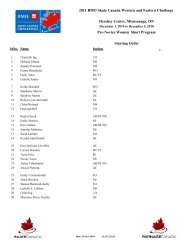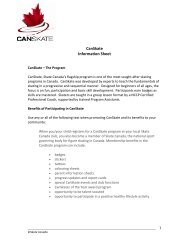LONG-TERM ATHLETE DEVELOPMENT - Skate Canada
LONG-TERM ATHLETE DEVELOPMENT - Skate Canada
LONG-TERM ATHLETE DEVELOPMENT - Skate Canada
You also want an ePaper? Increase the reach of your titles
YUMPU automatically turns print PDFs into web optimized ePapers that Google loves.
S K AT E C A N A DA’ S S TA G E S O F<br />
LO N G - T E R M AT H L E T E D E V E LO P M E N T<br />
<strong>Skate</strong> <strong>Canada</strong>’s Long-term Athlete Development Model<br />
(LTADM) is divided into a series of stages specific to the<br />
sport. <strong>Skate</strong> <strong>Canada</strong>’s model has been created with six<br />
stages:<br />
1. Learn to <strong>Skate</strong> (Active Start/FUNdamentals)<br />
(age: females 3-8; males 3-9)<br />
2. Learn to Train<br />
(age: females 7-11; males 8-12)<br />
3. Learn to Compete<br />
(age: females 9-13; males 10-14)<br />
4. Train to Compete<br />
(age: females 10-16; males 11-17)<br />
5. Learn/Live to Win<br />
(age: female 13-19; male 14-21) 15 +<br />
6. Active for Life (any age)<br />
It is our vision that athletes with a disability are<br />
incorporated into each stage of development through<br />
integration into existing programs in addition to tailor–<br />
made opportunities.<br />
Synchronized skating is included as its own section as it<br />
has been deemed a late specialization dicipline within<br />
our sport.<br />
Thus, the philosophy is that athletes will progress<br />
through the early stages of the LTADM prior to<br />
involvement in synchronized skating.<br />
LEARN TO SKATE LEARN TO TRAIN LEARN TO COMPETE<br />
L o n g - Te r m A t h l e t e D e v e l o p m e n t<br />
865 Sheord Road, Ottawa, Ontario K1J 1H9<br />
Phone 613.747.1007 I Toll Free 1.888.747.2372 I Fax 613.748.5718 I Toll Free Fax 1.877.211.2372<br />
13<br />
Each of the six stages is broken down into two main<br />
sections:<br />
1. Skills that should be acquired within that<br />
particular stage of development<br />
2. General guidelines for club programming and<br />
coaching 2 .<br />
Appropriate development within each stage is essential<br />
as the end of one stage acts as the entry point for the<br />
next. The text contained in the “Sport-Specific Skills” and<br />
“General Skills” tables in each stage, therefore, represent<br />
the skills that must be acquired before exiting that<br />
specific stage.<br />
Only by following developmental age appropriate<br />
activities and building a foundation in each stage for the<br />
next can athletes optimally prepare to progress toward<br />
their goals. Each stage includes multiple components<br />
necessary to overall athlete development including<br />
general and sport-specific skills, psychological and social<br />
skills, and training-time and competitions.<br />
A summary of <strong>Skate</strong> <strong>Canada</strong>’s stages is attached as<br />
Appendix C.<br />
LIVE TO WIN<br />
TRAIN TO COMPETE LEARN TO WIN/<br />
ACTIVE FOR LIVE<br />
2 Specific information as to the correct coaching of skills and athlete progression is included in coaching education materials.


